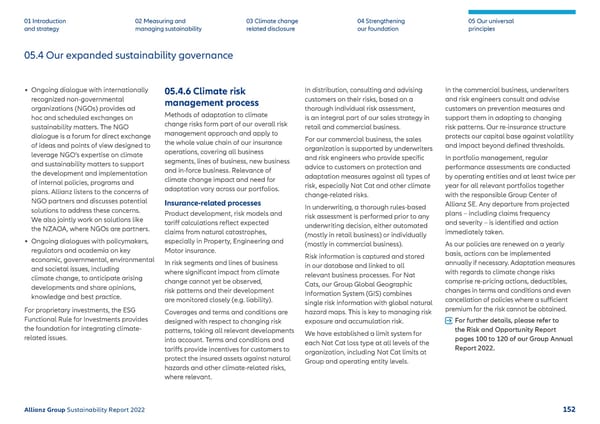01 Introduction and strategy 02 Measuring and managing sustainability 03 Climate change related disclosure 04 Strengthening our foundation 05 Our universal principles 05.4 Our expanded sustainability governance • Ongoing dialogue with internationally recognized non-governmental organizations (NGOs) provides ad hoc and scheduled exchanges on sustainability matters. The NGO dialogue is a forum for direct exchange of ideas and points of view designed to leverage NGO’s expertise on climate and sustainability matters to support the development and implementation of internal policies, programs and plans. Allianz listens to the concerns of NGO partners and discusses potential solutions to address these concerns. We also jointly work on solutions like the NZAOA, where NGOs are partners. • Ongoing dialogues with policymakers, regulators and academia on key economic, governmental, environmental and societal issues, including climate change, to anticipate arising developments and share opinions, knowledge and best practice. For proprietary investments, the ESG Functional Rule for Investments provides the foundation for integrating climate- related issues. 05.4.6 Climate risk management process Methods of adaptation to climate change risks form part of our overall risk management approach and apply to the whole value chain of our insurance operations, covering all business segments, lines of business, new business and in-force business. Relevance of climate change impact and need for adaptation vary across our portfolios. Insurance-related processes Product development, risk models and tariff calculations reflect expected claims from natural catastrophes, especially in Property, Engineering and Motor insurance. In risk segments and lines of business where significant impact from climate change cannot yet be observed, risk patterns and their development are monitored closely (e.g. liability). Coverages and terms and conditions are designed with respect to changing risk patterns, taking all relevant developments into account. Terms and conditions and tariffs provide incentives for customers to protect the insured assets against natural hazards and other climate-related risks, where relevant. In distribution, consulting and advising customers on their risks, based on a thorough individual risk assessment, is an integral part of our sales strategy in retail and commercial business. For our commercial business, the sales organization is supported by underwriters and risk engineers who provide specific advice to customers on protection and adaptation measures against all types of risk, especially Nat Cat and other climate change-related risks. In underwriting, a thorough rules-based risk assessment is performed prior to any underwriting decision, either automated (mostly in retail business) or individually (mostly in commercial business). Risk information is captured and stored in our database and linked to all relevant business processes. For Nat Cats, our Group Global Geographic Information System (GIS) combines single risk information with global natural hazard maps. This is key to managing risk exposure and accumulation risk. We have established a limit system for each Nat Cat loss type at all levels of the organization, including Nat Cat limits at Group and operating entity levels. In the commercial business, underwriters and risk engineers consult and advise customers on prevention measures and support them in adapting to changing risk patterns. Our re-insurance structure protects our capital base against volatility and impact beyond defined thresholds. In portfolio management, regular performance assessments are conducted by operating entities and at least twice per year for all relevant portfolios together with the responsible Group Center of Allianz SE. Any departure from projected plans – including claims frequency and severity – is identified and action immediately taken. As our policies are renewed on a yearly basis, actions can be implemented annually if necessary. Adaptation measures with regards to climate change risks comprise re-pricing actions, deductibles, changes in terms and conditions and even cancellation of policies where a sufficient premium for the risk cannot be obtained. [1) For further details, please refer to the Risk and Opportunity Report pages 100 to 120 of our Group Annual Report 2022. 152 Allianz Group Sustainability Report 2022
 Sustainability Report 2022 | Allianz Page 152 Page 154
Sustainability Report 2022 | Allianz Page 152 Page 154